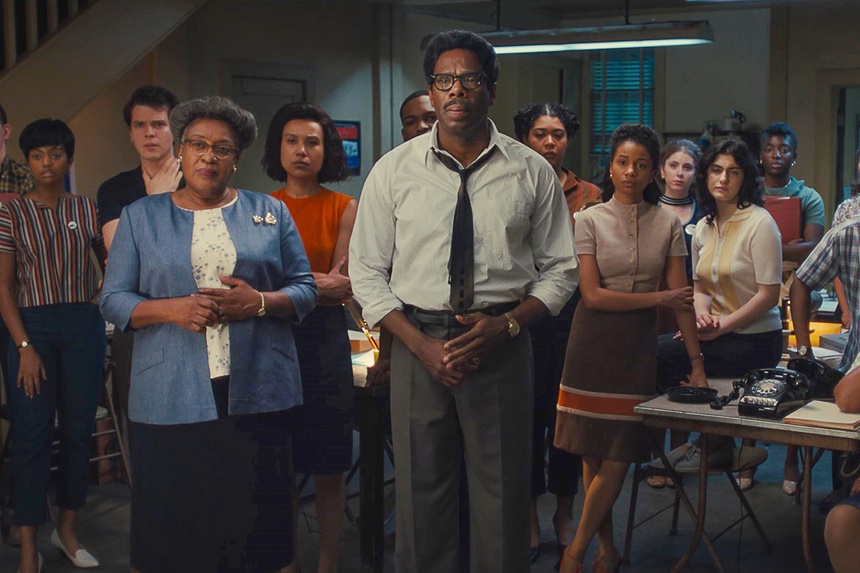Rustin
⭐️ ⭐️ ⭐️ ⭐️
Rating: PG 13
Run Time: 1 hour 46 minutes
Stars: Colman Domingo, Chris Rock, Aml Ameen, Jeffrey Wright
Writers: Julian Breece, Dustin Lance Black
Director: George C. Wolfe
In theaters and streaming on Netflix
Reviewed at the Toronto International Film Festival
Martin Luther King had a dream, but he might have delivered his iconic 1963 March on Washington speech to a deserted National Mall if not for a man named Bayard Rustin, who gets long-overdue recognition in this inspiring, at times infuriating, historical drama.
Most people have never heard of Rustin, a master organizer and logistician for the 1960s civil rights movement. That is more or less by design: It was Rustin’s job to remain behind the scenes, making the movement’s marquee figures look and sound good, and delivering the crowds who would carry their message to the world.
He was also gay — and not in that ’60s under-the-radar, marry-a-woman-and-raise-a-family-despite-everything way. Flamboyant and outspoken, Rustin floated through life as if his particular genius and fiercely held convictions would somehow elevate him above the decade’s sexual norms.
He was, of course, wrong. Often shunned even by those who admired him — including King himself — Rustin persisted to deliver the goods for the good of his people.
If you’re putting together a short list of Best Actor Oscar nominees, save a spot for Colman Domingo, who grabs the role of Rustin with both hands and does not let go. A longtime New York theater stalwart and cult TV favorite (Fear the Walking Dead), Domingo sears the screen with his portrayal of Rustin, a man whose passion for freedom and genius for organization barely outweigh his self-destructive tendencies, fueled by resentment for a world that rejects him, inside and out.
When last we encountered director George C. Wolfe, he was behind the camera for 2020’s Ma Rainey’s Black Bottom, a tuneful, if mournful, tale of 1927 Chicago that also proved to be the last appearance of the wonderful Chadwick Boseman. Advancing a few decades, Wolfe lands squarely in Harlem, Rustin’s chosen base of operations. As in his prior film, Wolfe creates a grittily immersive sense of place — but it is in his leading man that he captures the radical urgency and unprecedented opportunity of the 1960s civil rights movement.
The 21st century take on the March on Washington goes something like this:
Martin Luther King: “Hey, let’s get 2.5 million people to come stand on the mall while I make a speech that will change the world!”
Everyone Else: “Yeah!”
But as the energetic script by Julian Breece and Oscar winner Dustin Lance Black (Milk) explains, Rustin felt the march would give the movement a spectacular shot in the arm, but his idea was bitterly opposed by many of the era’s most influential Black activists, including NAACP head Roy Wilkins (played by a dour and intimidating Chris Rock) and New York Congressman Adam Clayton Powell Jr. (an insufferably pompous Jeffrey Wright). Even Rustin’s old friend King (Aml Ameen), estranged from Rustin for fear of his sexuality discrediting the movement, leans toward the incremental approach that, to Rustin, seems to be accomplishing little more than getting Freedom Riders killed in the South.
When the powers that be reluctantly give Rustin the go-ahead to organize the march, the film shifts into high gear, which is to say we get a good half-hour of fly-on-the-wall scenes, witnessing Rustin alternately cajoling, bullying, and begging his eager young volunteers to scratch up cash, commandeer buses, and, most importantly, somehow enlist millions of people to make the trip to D.C. in the dog days of August.
Of course, we know how this story ends, so much of the fun here is in watching the pieces fall into place — and how Rustin serves as the glue that holds them all together.
Still, it’s hard not to share the man’s trepidation as, on the day of the march, after months of projecting brash confidence, Domingo’s Rustin stands on the steps of the Lincoln Memorial, squints into the morning sun, and mutters, “Lord, I hope and pray they come today.”
It’s a moment that captures perfectly the spirit of a man oozing with confidence, yet secretly aware that the world does not always reward outsiders, no matter how righteous their mission.
Become a Saturday Evening Post member and enjoy unlimited access. Subscribe now




Comments
Can’t wait to see it!
Hallelujah!